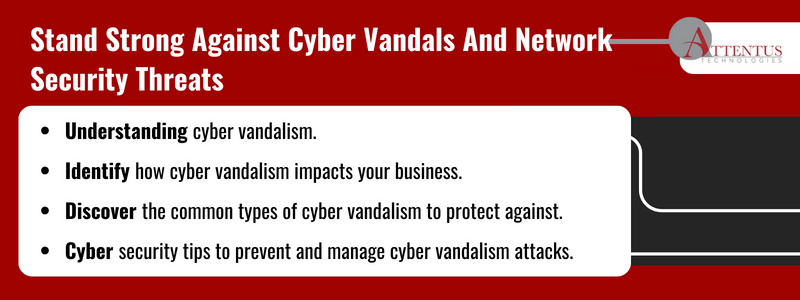Managing Network Security Threats
For businesses with an I.T. infrastructure and stored data, it is not a matter of whether your system will be attacked; it’s simply how often and how successfully. Network security threats are steadily growing and get more complex every day. For example, data breaches in the US alone have increased over 20% in 2023.
As businesses and consumers continue to deepen their online engagements, more and more private and personal data is stored in a variety of locations, sometimes without effective security. Notably, many cyber attacks exploit vulnerabilities in smaller third-party application vendors linked to larger enterprise systems.
Nearly every business relies on digital commerce to connect with vendors, partners, and customers.. The problem is many systems contain vulnerabilities that expose anyone else connected to them. According to a study published by Apple, 98% of organizations with vendor relationships experienced a data breach since 2021. This guide describes cyber vandalism and how it contributes to the growing network security problem, and tips for managing network security.

What is cyber vandalism?
Cyber vandalism is a type of cyber-attack where a computer network, website, or app is damaged, disrupting business. Typically, cyber vandalism does not involve stealing data or infiltrating a network system.
Cyber vandalism examples:
- Website defacement
- DDoS Attacks
- Social media attacks
- Communication system attacks (Email, SMS)
Cyber vandalism is usually an act performed by individuals, former employees, or groups with a grudge against a business. Or, cyber vandalism may be content or postings on social media designed to embarrass a business or devalue its reputation. These attacks can be costly when it comes to repairing brand reputation and rebuilding customer trust.
How does cyber vandalism impact your business?
Cyber vandalism can hit businesses hard, both in terms of money and reputation. First off, there’s the expense of fixing the damage. Then, there’s the cost of trying to repair the image of your brand or business. It takes time to rebuild trust with customers, and during that period, you’re probably losing business.
It’s highly likely businesses don’t set aside resources to fix damages. So, either you have to hire a contractor to fix the issue, or you take resources from other projects to make the repairs. Either way, it increases costs. Then, there’s the likelihood of launching new marketing campaigns and public announcements to attempt to repair the reputation damage.
During Distributed Denial of Service (DDoS) attacks, cybercriminals incapacitate your website, disrupting the flow of incoming and outgoing orders. The restoration process demands substantial effort. Additionally, there might be costs associated with issuing refunds or implementing special promotions to incentivize customers to return.
Your business needs to make cybersecurity priority one. Consider practicing constant or continuous improvement to stay ahead of evolving threats. This involves regularly assessing and enhancing your cybersecurity measures to adapt to new tactics employed by cybercriminals, keeping employees trained, and embracing a culture that proactively enhances cybersecurity. If you’ve experienced cyber vandalism attacks, then you are likely in line for more serious cyber-attacks, which may cost you millions in regulatory fines and damages. By continuously improving your cyber security, you can prevent business losses.
Consider working with a business partner like Attentus, which practices constant improvement in everything in everything they do for their clients. By seeking constant improvement, businesses can avoid and manage any I.T. challenge, including cybersecurity.
Tips on preventing and managing cyber-attacks
Implement basic cybersecurity strategies, including:
- Enforce strong password creation, regular password resets, and MFA (multi-factor) authentication.
- Employee security training that’s ongoing and regularly updated.
- Maintain servers, databases, APIs, endpoints, devices, and applications to keep them on the latest version.
- Install all security patches as soon as possible.
- Backup data
- Practice continuous security monitoring to detect unauthorized access to all systems, including partner connections.
- Have a plan in place with a security team to manage all security attacks or incidents effectively.
Caring about cybersecurity is more than just a necessity; it’s about actively practicing continuous improvement. Your systems and devices need constant updates and monitoring to thwart potential attacks. Effectively managing and responding to attacks is equally crucial. Yes, it may sound like a lot, but cybersecurity is non-negotiable for businesses in today’s digital landscape. It’s not a matter of if, but when you face an attack. Being prepared to defend your business is the key to safeguarding its future.
Consider a quality MSP provider with security expertise and a penchant, no – a devotion to constant improvement for their clients. Attentus is an MSP you can trust to manage your cybersecurity strategy and keep your business secure. Attentus can assist in setting up the latest advanced security measures, proactively managing servers and I.T. networks, performing penetration and security testing, and helping you manage a security incident before it costs you millions in fines, fees, and lost business reputation.
Secure your business with Attentus
Choose an MSP like Attentus, which is an active partner in your business growth and success. Attentus is a leading provider of I.T. services in the Seattle area. Make your I.T. management and security strategy simple, even exceptionally effective, but not scary.
Leave it to Attentus to manage your I.T. infrastructure. Be in control without having to manage every I.T. detail. At Attentus, we communicate and collaborate proactively to keep your business up and running at peak performance. Consider getting an accurate price quote in 30 minutes.

